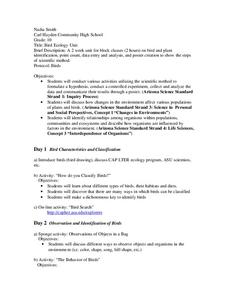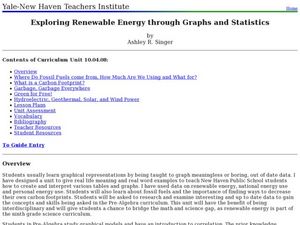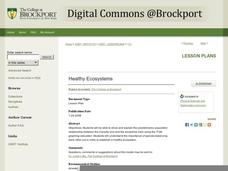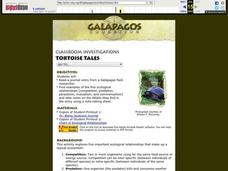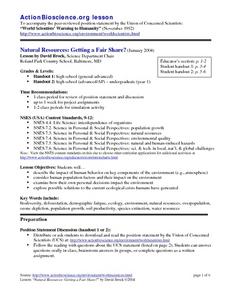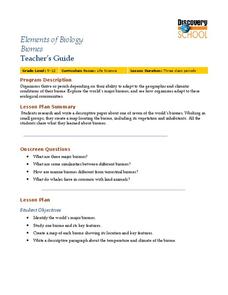Curated OER
Erase It! Deforestation
Sudents comprehend the importance of forests in the Earth's ecological system. They discuss the various ways people are ridding the world of large evergreen, deciduous, and rainforest areas and how deforestation harms the environment.
Curated OER
Bird Ecology Unit
Tenth graders conduct various activities utilizing the scientific method to formulate a hypothesis, conduct a controlled experiment, collect and analyze the data and communicate their results through a poster. They also identify...
Chicago Botanic Garden
Leaf Litter Ecology Lab
Some organisms spend their entire lives in leaf litter. The third in a series of six is a great instructional activity exploring the community of leaf litter. Groups gather and then spread leaf litter over white paper and remove...
Curated OER
Growing Vegetable Soup
Students use children's literature in order to think about the concept of creating a garden. This is done through conducting simple research about types of plants that could be grown in the area and how to care for them. Then the garden...
Curated OER
Stabilization Wedges Game
Teamwork and critical thinking combine to for a creative lesson on reducing greenhouse gas emissions. Ebullient environmental studies learners play a game in which they strategize how to place colorful energy wedges together to create a...
Curated OER
The Math of Renewable Energy
Students research additional information about questions on their worksheet. In this energy activity, students develop visual aids of their proposed solution to the problem. They present their work in class.
Curated OER
A Matter of Accountability
Pupils conduct a mock trial focusing on environmental accountability of industrialized nations. As an example, they evaluate evidence provided on carbon dioxide emissions. They participate in a mock trial of industrialized nations by the...
Curated OER
Exploring Renewable Energy Through Graphs and Statistics
Ninth graders identify different sources of renewable and nonrenewable energy. In this math lesson, learners calculate their own carbon footprint based on the carbon dioxide they create daily. They use statistics to analyze data on power...
Curated OER
Wetland vs. Stream Macroinvertebrates
A link to a comprehensive macroinvertebrate guide gives you the information needed to prepare for this field study activity. Sample macroinvertebrates are collected from areas representing different environmental conditions. Junior...
Curated OER
Rapa River Watch
Assess the risk of introducing a non-native species of snail to four different estuaries. Lab groups conduct research as habitat evaluation and present their conclusions to the class. The resource has a comprehensive booklet containing...
Curated OER
A River Ran Wild: An Environmental History
The Nashua River serves as the focal point of an investigation of the treatment of and care for natural resources. A reading of A River Rand Wild: An Environmental History by Lynne Cherry, launches the study and class members consider...
College at Brockport
Healthy Ecosystems
Is there a connection between the snowshoe hare population and the lynx population? Young scientists will examine this question and graph actual data to determine the relationship between these two species, as well as researching another...
Desert Museum
Daisy Ecology
Here's a fine lesson that combines poetry with life sciences. Learners carefully listen to a poem that's all about a food chain. As the poem is read, learners name the producer, the herbivore, the carnivore, and the omnivore. Lots of...
Curated OER
Landscape Garden Makeover
A project-based learning plan focuses on landscapes in the community. After identifying problems, such as dead trees or misplaced automatic sprinklers, learners design solutions, contact local organizations to fix the problems, and do...
World Wildlife Fund
Arctic Food Chain
Explore the food chains that support Arctic ecosystems. A class discussion on interdependence and the different roles plants and animals play in ecosystems provides students with the knowledge to complete a worksheet asking them to...
Curated OER
Tortoise Tales
Students read journal entry from a Gal??pagos field researcher, find examples of five ecological relationships (competition, predation, parasitism, mutualism, and commensalism) and take notes on the details they find in the entry using a...
Curated OER
Natural Disasters
Students read and discuss the article "Succession" by Bill Freedman. They create a labeled sketch of each type of ecological succession from its beginning to its climax community. Students create an article about a natural disaster as if...
Curated OER
Tread Lightly: Visualizing Footprints
The student reflects on concepts of ecological footprints and climate changes. In this Art lesson, students will produce a visual representation showing understanding of how ecology and climate affects the world.
Curated OER
Cypress/Tupelo Swamps
Students study the geologic history of terrain, soils, and drainage patterns. They recognize ecological processes that determine the dynamic nature of habitats. They investigate the influence of human activity on the landscape.
Curated OER
Natural Resources: Getting a Fair Share?
Students explore the impact of human behavior on key components of the environment, examine how theirn own personal decisions have added to the problem, and explore possible solutions to the current ecological crisis.
Curated OER
Using A Winogradsky Column to Analyze Microbial Communities
Students use easily obtained materials to study ecological succession in a microbiological community. This investigation is appropriate for a variety of age groups. Elementary Students be fascinated by the changes occurring over time...
Curated OER
Home, Home on the River
Students examine the complex issues that result from human use of ecologically sensitive areas. They investigate these issues from the point of view of their major/career path.
Curated OER
Toward a Sustainable Agriculture
Young scholars examine how to use ecological analysis to animal production systems. In this sustainable agriculture lesson students examine where the nutrients flow in a system and complete several activities.
Curated OER
Biomes
Students explore the worlds biomes and see how organisms adapt to these ecological communities. In this world's biomes instructional activity students research and write a paper about one of the world's biomes.
Other popular searches
- Population Ecology
- Animal Ecology
- Human Ecology
- Behavioral Ecology
- Ecology Principles
- Community Ecology
- Pond Ecology
- Ecology Organizations
- Global Ecology
- Ecology Ethics
- Ecology Food Webs
- Ecology and Plants

